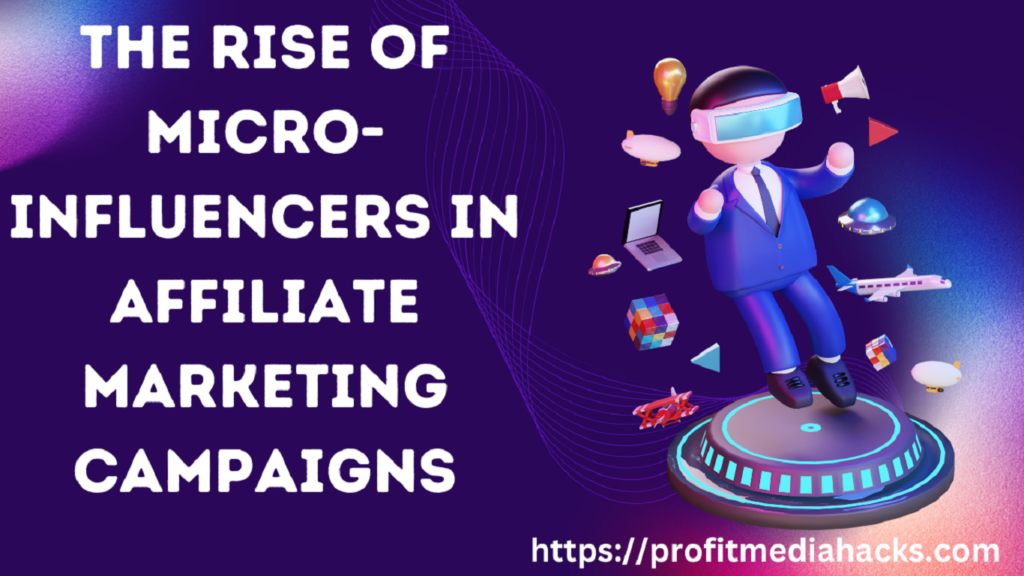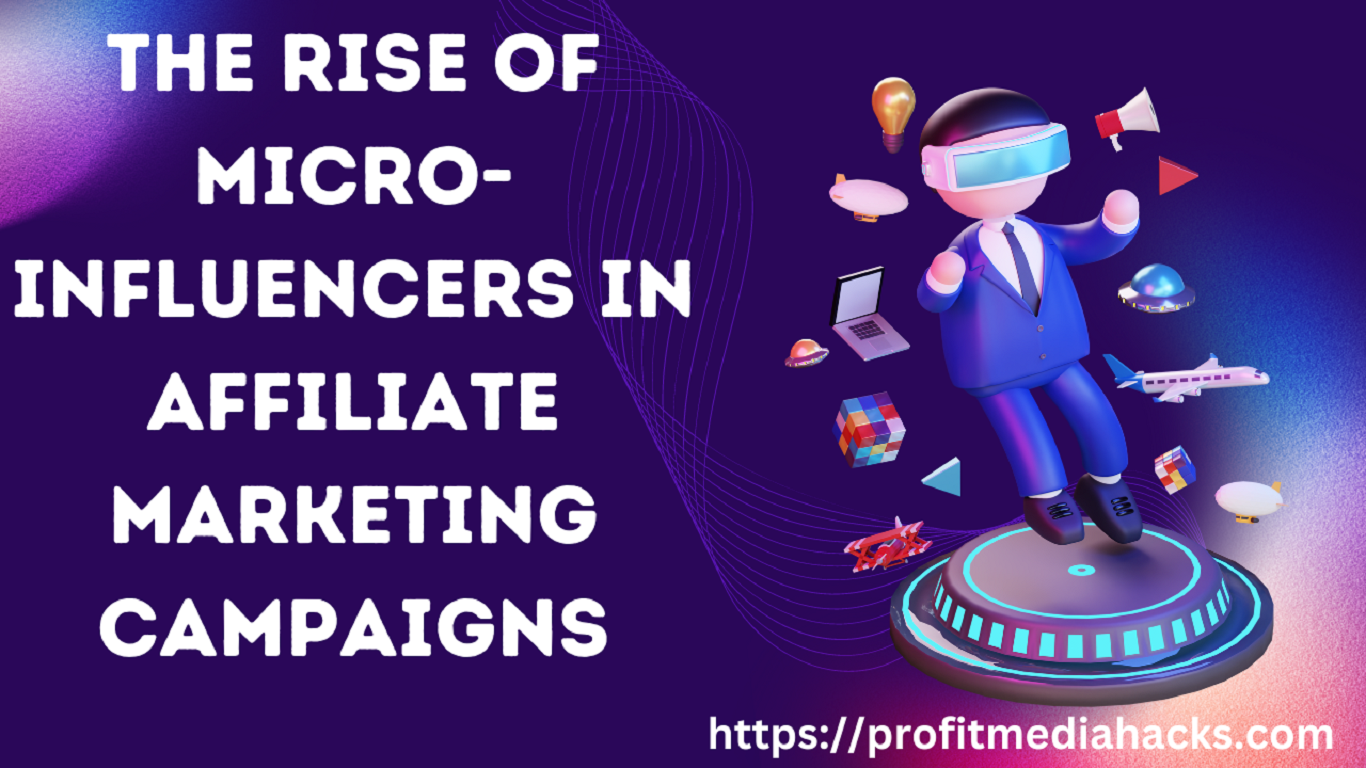In recent years, the world of digital marketing has witnessed a significant shift in the way brands approach influencer marketing. Gone are the days of solely relying on mega-celebrities to promote products and services. Instead, a new trend has emerged, championing the rise of micro-influencers in affiliate marketing campaigns. Micro-influencers, with their niche-focused content and engaged following, have proven to be a potent force in driving sales and brand awareness. In this article, we will explore the reasons behind the surge in micro-influencer usage and the benefits they bring to affiliate marketing campaigns.
Easiest & Proven Way to Make $100 Daily with 0 COST – Watch THIS FREE Training to START >>

1. Authenticity and Relatability:
Micro-influencers often boast a modest yet dedicated following that shares their interests and passions. Unlike celebrity influencers, their content tends to be more genuine and relatable, resonating strongly with their audience. Consumers are more likely to trust recommendations from micro-influencers they consider friends rather than from distant celebrities. This authenticity fosters a higher level of engagement and loyalty among their followers, making them an ideal choice for affiliate marketing collaborations.
2. Cost-Effectiveness:
Collaborating with macro-influencers or celebrities can be prohibitively expensive for many brands, especially smaller ones or startups. On the other hand, working with micro-influencers is considerably more cost-effective. Micro-influencers are often willing to promote products or services in exchange for free samples, discounts, or a small commission for each sale generated through their unique affiliate links. This approach allows brands with limited marketing budgets to reach their target audience efficiently without overspending on influencer partnerships.
3. Niche Markets and Targeted Audiences:
Micro-influencers often focus on specific niches, such as fitness, beauty, travel, or technology. By collaborating with micro-influencers within their niche, brands can tap into highly targeted audiences that are genuinely interested in their offerings. This precise targeting increases the likelihood of converting leads into customers since the content is tailored to address the specific needs and preferences of the audience.
4. Enhanced Engagement and Reach:
While macro-influencers may boast millions of followers, their engagement rates can be relatively low due to the sheer scale of their audience. On the other hand, micro-influencers tend to have a more engaged and interactive community. Their followers are more likely to comment, like, and share their content, thus increasing the reach of the affiliate marketing campaign. This higher engagement translates into better visibility and ultimately leads to a higher return on investment (ROI) for the brand.
5. Building Long-Term Relationships:
Collaborating with micro-influencers allows brands to establish long-term partnerships. Unlike one-off engagements with celebrities, brands can foster ongoing relationships with micro-influencers, creating a sense of loyalty and commitment. As influencers become more familiar with the brand and its products, they can provide more authentic and in-depth recommendations, which further boosts the success of the affiliate marketing campaign over time.
Authenticity and Relatability:
In the fast-evolving world of influencer marketing, one aspect has emerged as a driving force behind the success of affiliate marketing campaigns – authenticity and relatability. As consumers become increasingly discerning, they seek genuine connections with the brands they support. This is precisely where micro-influencers shine, with their ability to deliver authentic and relatable content to their engaged followers. In this section, we delve deeper into the significance of authenticity and relatability in the context of micro-influencers and how it impacts affiliate marketing campaigns.
Personal Stories, Real Experiences:
Micro-influencers have an innate talent for weaving personal stories and sharing real-life experiences related to the products or services they endorse. This storytelling approach resonates with their audience, fostering a sense of trust and credibility. By presenting themselves as genuine users of the products, micro-influencers can sway the purchasing decisions of their followers.
Niche Expertise:
Micro-influencers often operate within specific niches, cultivating a loyal community of like-minded individuals. Their expertise in these niches allows them to offer authentic product recommendations, backed by their in-depth knowledge. As a result, their followers perceive them as reliable sources of information, heightening the effectiveness of affiliate marketing campaigns.
Interactive Engagement:
Unlike macro-influencers with a vast following, micro-influencers tend to engage actively with their audience. They respond to comments, address queries, and actively participate in discussions. This two-way interaction fosters a stronger bond between the influencer and their followers, creating a sense of friendship and relatability.
Unfiltered Content:
Micro-influencers often present unfiltered and honest opinions about the products they promote. This transparent approach contrasts with polished and overly curated content often associated with celebrity influencers. Their authenticity is appreciated by their followers, who perceive them as genuine advocates for products they truly believe in.
Sharing Everyday Moments:
Micro-influencers incorporate everyday moments into their content, showcasing how products seamlessly fit into their lives. By integrating products into their daily routines, micro-influencers demonstrate practical usage, making their endorsements more convincing and relatable to their audience.
Authenticity and relatability are the cornerstones of micro-influencer marketing and a vital catalyst in driving successful affiliate marketing campaigns. As consumers continue to seek authentic connections with brands, micro-influencers’ ability to share personal stories, provide niche expertise, engage interactively, and present unfiltered content will remain paramount. By harnessing the power of authenticity, brands can forge deeper connections with their target audience and achieve remarkable results in their affiliate marketing endeavors.
Cost-Effectiveness:
In the ever-competitive landscape of digital marketing, the allure of cost-effectiveness has steered brands towards exploring new avenues for maximizing their return on investment. One such avenue that has gained significant traction in recent times is the utilization of micro-influencers in affiliate marketing campaigns. The cost-effectiveness of collaborating with micro-influencers is compelling, particularly for smaller brands with limited marketing budgets. In this section, we delve into the various aspects of cost-effectiveness that make micro-influencers an attractive choice for brands looking to optimize their affiliate marketing efforts.
Affordable Partnerships:
Unlike macro-influencers or celebrities, who often demand exorbitant fees for brand collaborations, micro-influencers are more amenable to flexible arrangements. Many are willing to partner in exchange for free products, services, or a modest commission based on the sales generated through their unique affiliate links, making them a budget-friendly option for brands.
Easiest & Proven Way to Make $100 Daily with 0 COST – Watch THIS FREE Training to START >>
Targeted Reach:
Cost-effectiveness is heightened when brands collaborate with micro-influencers operating within specific niches that align with their products or services. By tapping into the niche markets of micro-influencers, brands can achieve a more targeted reach, thereby ensuring that their marketing budget is optimally utilized in reaching potential customers who are genuinely interested in what they have to offer.
Efficient Campaign Scaling:
For brands with a limited budget, partnering with micro-influencers allows for efficient campaign scaling. Instead of investing heavily in a single macro-influencer, brands can collaborate with multiple micro-influencers, diversifying their reach and increasing their chances of conversions, all while staying within budget.
Content Versatility:
Micro-influencers often create content independently, requiring minimal brand intervention. This saves brands the costs associated with elaborate content production and allows them to benefit from the authentic and relatable content styles that micro-influencers are known for.
Long-Term Value:
Building long-term partnerships with micro-influencers can yield substantial cost savings for brands. As influencers become more familiar with the brand and its offerings over time, their content becomes more aligned with the brand’s values, resulting in more effective promotions and potentially lowering the cost per acquisition.
The cost-effectiveness of micro-influencers in affiliate marketing campaigns has revolutionized the way brands approach influencer collaborations. Their affordability, targeted reach, campaign scalability, content versatility, and potential for long-term value make them an attractive proposition for brands seeking impactful yet budget-friendly marketing solutions. By harnessing the power of micro-influencers, brands can maximize their ROI, expand their customer base, and build strong, sustainable relationships with their audience.
Niche Markets and Targeted Audiences:
In the vast digital landscape, where consumers are bombarded with a plethora of marketing messages, brands are increasingly recognizing the significance of reaching the right audience with the right message. This realization has sparked a growing interest in micro-influencers, who excel in cultivating niche markets and engaging with highly targeted audiences. By tapping into the power of niche markets and targeted audiences, brands can amplify the impact of their affiliate marketing campaigns, ensuring that their message resonates with the most relevant consumer base. In this section, we explore how micro-influencers’ specialization in niche markets delivers exceptional results in affiliate marketing campaigns.
Niche Expertise:
Micro-influencers are experts in their respective niches, whether it be fitness, fashion, food, or technology. Their in-depth knowledge and passion for their chosen niche make them credible authorities in the eyes of their followers. When these influencers promote affiliate products or services, their endorsements carry substantial weight, leading to higher levels of trust and engagement.
Relevant and Tailored Content:
The content created by micro-influencers is laser-focused on their niche, addressing the specific interests and pain points of their audience. This relevance ensures that the affiliate marketing campaign’s message aligns perfectly with the needs of the targeted audience, enhancing the likelihood of conversions and driving a greater return on investment.
Nurturing Niche Communities:
Micro-influencers cultivate tight-knit communities of like-minded individuals who share common interests. By collaborating with influencers within the same niche, brands can tap into these existing communities and leverage the built-in trust and loyalty that micro-influencers have fostered, significantly expanding the reach of their affiliate campaigns.
Higher Conversion Rates:
Targeted marketing efforts translate to higher conversion rates. When a micro-influencer promotes a product or service that precisely fits their audience’s interests, the chances of converting those leads into customers skyrocket. This increased conversion rate is a direct result of the trust and credibility that micro-influencers have built within their niche communities.
Measurable Impact:
Working with micro-influencers in niche markets allows brands to track and measure the direct impact of their affiliate marketing campaigns more effectively. As these influencers cater to specific audiences, it becomes easier for brands to attribute sales, leads, and engagement directly to their promotions, providing valuable insights into the campaign’s effectiveness.
The power of niche markets and targeted audiences, coupled with the expertise of micro-influencers, makes for a winning combination in affiliate marketing campaigns. Brands that collaborate with micro-influencers in their respective niches can benefit from their authoritative content, relevant messaging, and loyal communities. By engaging with the right audience through micro-influencers, brands can amplify their reach, achieve higher conversion rates, and ultimately drive greater success in their affiliate marketing endeavors.
Enhanced Engagement and Reach:
In the ever-competitive landscape of digital marketing, capturing the attention of consumers and fostering genuine engagement has become a paramount goal for brands. Micro-influencers have emerged as invaluable assets in achieving this objective, boasting an unparalleled ability to deliver enhanced engagement and reach in affiliate marketing campaigns. With their smaller yet more engaged and interactive communities, micro-influencers have proven to be potent catalysts for driving brand awareness and facilitating meaningful interactions. In this section, we delve into the various ways in which micro-influencers elevate engagement levels and broaden the reach of affiliate marketing campaigns.
Active and Responsive Communities:
Micro-influencers often cultivate highly engaged communities where followers actively interact and participate in discussions. This two-way engagement fosters a sense of community and trust, making their audience more receptive to the influencer’s recommendations and affiliate promotions.
Easiest & Proven Way to Make $100 Daily with 0 COST – Watch THIS FREE Training to START >>
Authentic Conversations:
Micro-influencers excel in creating authentic conversations around products or services they endorse. Their genuine interest and personal experiences with the offerings lend credibility to their endorsements, encouraging their audience to engage in thoughtful discussions and share their own experiences.
Virality and Shareability:
Micro-influencers’ content is more likely to go viral within their niche communities. As their followers share their content, the reach of the affiliate marketing campaign expands organically, reaching new audiences who share similar interests and increasing the potential for conversions.
Diverse Content Formats:
Micro-influencers are skilled at crafting diverse content formats, such as videos, stories, and interactive posts. This versatility keeps their audience engaged and excited about their content, resulting in higher levels of user interaction and time spent engaging with the brand’s offerings.
Collaborative Campaigns:
Brands can leverage the influence of multiple micro-influencers simultaneously through collaborative campaigns. Coordinated promotions with several micro-influencers can create a snowball effect, magnifying the campaign’s impact and generating heightened engagement from a broader audience.
Enhanced engagement and reach are indispensable elements in the success of affiliate marketing campaigns, and micro-influencers excel in delivering both. Their ability to foster active and responsive communities, facilitate authentic conversations, drive viral content, present diverse content formats, and participate in collaborative campaigns sets them apart as influential marketing partners. By harnessing the potential of micro-influencers, brands can establish deeper connections with their target audience, amplify brand awareness, and achieve substantial returns on their affiliate marketing investments.
Building Long-Term Relationships:
In the ever-evolving realm of influencer marketing, forging genuine and long-lasting connections between brands and their target audience has become a primary focus. Micro-influencers have emerged as catalysts in this pursuit, as they possess a unique ability to build authentic, long-term relationships with their engaged communities. In the context of affiliate marketing campaigns, fostering enduring partnerships with micro-influencers holds immense value, offering brands the opportunity to leverage consistent advocacy and credibility over time. In this section, we delve into the significance of building long-term relationships with micro-influencers and the advantages it brings to affiliate marketing endeavors.
Authentic Advocacy:
Long-term collaborations enable micro-influencers to genuinely align themselves with the brand’s values and offerings. This authenticity translates into more credible product endorsements, as their audience perceives the influencer as a trusted advocate who has consistently supported and benefited from the brand.
Deep Understanding of the Audience:
Over time, micro-influencers develop an in-depth understanding of their audience’s preferences, needs, and pain points. This intimate knowledge allows them to tailor their affiliate marketing content effectively, ensuring that promotional messages resonate perfectly with their followers.
Building Trust and Loyalty:
Consistent brand promotion by a micro-influencer fosters trust and loyalty among their audience. As the influencer continually vouches for the brand and its products, their followers become more inclined to make purchases based on the established trust.
Diverse and Engaging Content:
Long-term partnerships offer the opportunity to experiment with diverse content formats and marketing strategies. Micro-influencers can incorporate creative and engaging approaches in their affiliate promotions, keeping their audience interested and invested in the brand.
Ongoing Campaign Optimization:
Long-term relationships allow brands and micro-influencers to analyze campaign performance continuously. By tracking results and making data-driven adjustments, both parties can optimize the affiliate marketing strategy for better outcomes over time.
Building long-term relationships with micro-influencers is a strategic approach that enhances the effectiveness of affiliate marketing campaigns. The authentic advocacy, deep understanding of the audience, trust and loyalty, diverse content creation, and ongoing campaign optimization all contribute to a mutually beneficial partnership. By investing in these relationships, brands can establish enduring connections with their target audience, elevate brand credibility, and foster sustainable growth in their affiliate marketing efforts. As the digital marketing landscape continues to evolve, prioritizing long-term relationships with micro-influencers will remain a pivotal strategy for successful affiliate marketing campaigns.
Conclusion:
The rise of micro-influencers in affiliate marketing campaigns is a testament to the power of authenticity, relatability, and targeted outreach. As consumers increasingly seek genuine connections with brands, micro-influencers have emerged as the ideal conduit for fostering these relationships. By leveraging the unique strengths of micro-influencers – their genuine content, niche expertise, cost-effectiveness, and engaged communities – brands can elevate their affiliate marketing efforts to new heights. As the digital landscape continues to evolve, embracing micro-influencers as valuable brand ambassadors will undoubtedly remain a winning strategy for successful affiliate marketing campaigns.
Easiest & Proven Way to Make $100 Daily with 0 COST – Watch THIS FREE Training to START >>
Thank you so much for taking the time to read my article “The Rise of Micro-Influencers in Affiliate Marketing Campaigns”. Stay Safe!!!!













